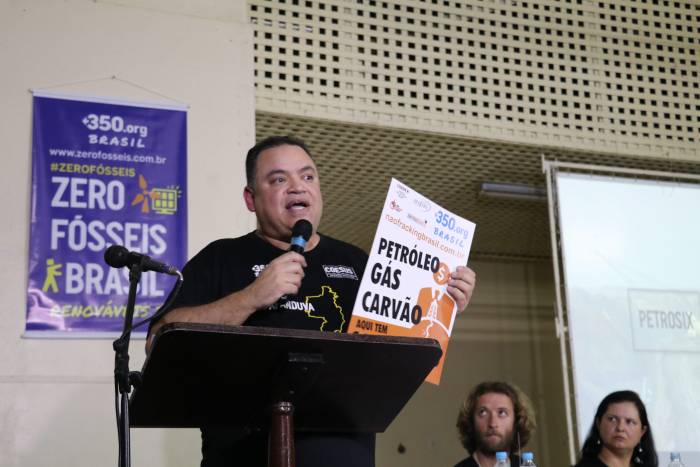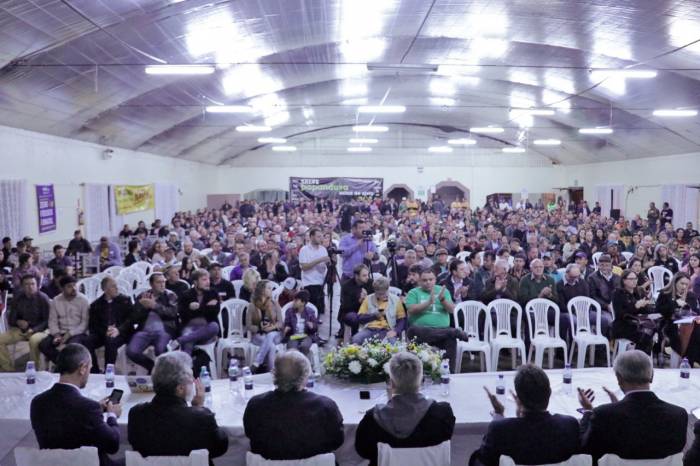After the definitive law in the neighboring state of Paraná, a bill prohibiting exploration in Santa Catarina state was approved by the Legislative Assembly and is being analyzed by the Governor

After several mobilizations, which were carried out in more than 48 municipalities, the prohibition of oil and shale gas exploration in Santa Catarina State, South Brazil, could become a reality. On Tuesday evening (16), the bill No. 145/2019 was approved in the Legislative Assembly of Santa Catarina (Alesc), authored by deputy Valdir Cobalchini, which ensures the ban throughout the territory of Santa Catarina. Thus, more than 7 million people who live in the fifth richest state in Brazil can maintain their activities in agriculture, industry, tourism and fishing without the major impacts generated by the practices. The next step is the analysis of the text by the Governor, Carlos Moisés, for subsequent government sanction.
“Since 2016, we at 350.org Brazil, Arayara International Institute, and No Fracking Brazil for Climate, Water and Life Coalition (COESUS) have worked together with communities, farmers, technicians, organizations, associations and volunteers to mobilizing more than 50 municipalities to fight against shale gas and mining in the state of Santa Catarina. I would like to highlight the participation of the Association of Municipalities of the Upper Vale do Itajaí (AMAVI) and Caritas de Santa Catarina that has been supporting us and helped us to mobilize more than 28 municipalities against fracking from the beginning. In Papanduva, we have the Associação de Proteção da Bacia do Rio São João e da Bacia do Rio Papanduva (PRORIOS) and together we mobilized another 15 municipalities. In other words, the approval is a great victory for immense teamwork, which today can save the people of Santa Catarina state from this disaster”, celebrates the associate director of Campaigns and Mobilizations of 350.org Latin America and founding director of COESUS, Juliano Bueno de Araújo.
Luciano Augusto Henning, a researcher at the Guarani Serra Geral Network Project and COESUS volunteer, highlights the importance of prohibiting extraction, since the techniques could contaminate the Guarani and Serra Geral aquifers, and would also bring numerous other problems, such as the territorial issue.
“The extraction of shale oil and gas would be an activity that would compete with and greatly harm the agriculture of Santa Catarina state, which today is already well established economically,” says Henning.
 Cobalchini, deputy author of the project, is confident about the government’s sanction, “freeing the territory of Santa Catarina from this evil that was threatening it. “In addition to the damage to the environment, the production of the thousands of farmers would be compromised, causing them to lose their properties, leaving the land unsuitable for planting and also suffering from serious phytosanitary restrictions on their products. We hope that, just like in Paraná state, this law will be sanctioned,” he adds.
Cobalchini, deputy author of the project, is confident about the government’s sanction, “freeing the territory of Santa Catarina from this evil that was threatening it. “In addition to the damage to the environment, the production of the thousands of farmers would be compromised, causing them to lose their properties, leaving the land unsuitable for planting and also suffering from serious phytosanitary restrictions on their products. We hope that, just like in Paraná state, this law will be sanctioned,” he adds.
Deputy Fabiano da Luz, proponent of the public hearing that was held in June in the municipality of Papanduva, in Santa Catarina State, also recalled that the two exploration techniques are extremely harmful and contaminate the soil, water, cause cancer, being tragic for the entire state. “The Legislative Assembly took a big step with the approval of this project, with 31 votes in favor and two against. We do not want this to be the reality of the state, because Santa Catarina has an unparalleled wealth and we have already been exploited too much,” says Luz.
Understand the harm
Shale is one of the main metamorphic rocks of sedimentary origin, resulting from the decomposition of mineral and organic matter at the bottom of inland lakes or seas. Considering that there are two types of shale, bituminous and pyrobetuminous, two techniques are applied for their extraction.
One of them is known in Brazil as Petrosix – currently applied in São Mateus do Sul, Paraná state, and in countries such as Canada and India –, which consists of heating the oil shale to high temperatures, thus releasing an oil similar to petroleum, together with residues that contain high levels of carbon and sulfur. Its main socio-environmental impacts include respiratory and carcinogenic problems, water, air and soil contamination, land expropriation, desertification, loss of biodiversity, and worsening of global warming.
Fracking, on the other hand, is a technology used to extract the pyrobetuminous shale – consisting of deep drilling of the soil to insert a pipe through which 7 to 30 million liters of water, sand and more than 700 toxic chemical products with carcinogenic potential are injected under high pressure – and may even be radioactive – to fracture the rock and then release the shale gas.
The technique, as well as Petrosix, also causes countless risks to life, among them the contamination of drinking water not only on the surface but also in underground sources, the sterilization of the soil, making it infertile for agriculture, contaminating production and making livestock and tourism unviable – factors that drastically affect the generation of employment and income; serious and irreversible damages to health, such as respiratory, cardiac, neurological, cancer, congenital malformation, sterility in women, increased infant and perinatal mortality, among others.
##
CONTACT: Paulinne Giffhorn, communications coordinator of the Arayara International Institute and the Non-Fracking Brazil for Climate, Water and Life Coalition – [email protected] / +55 41 99823-1660